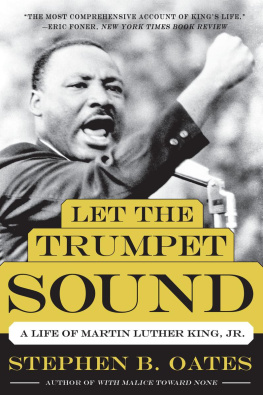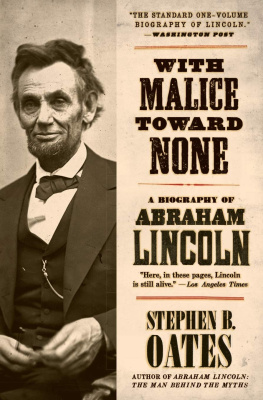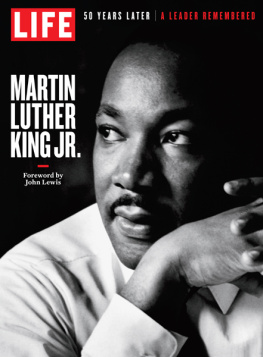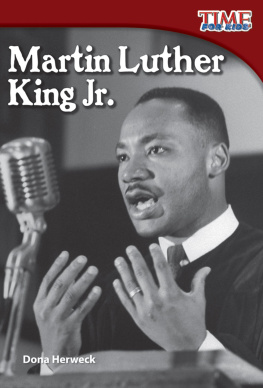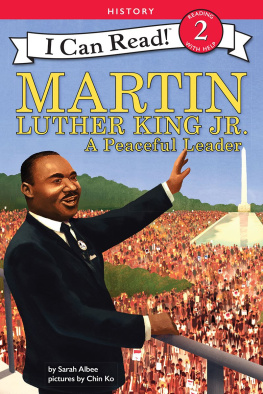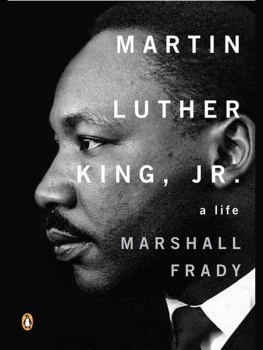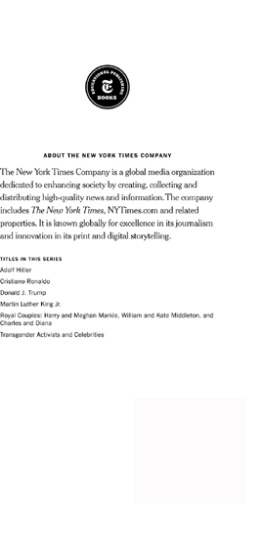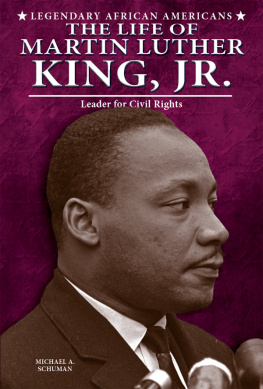A Life of Martin Luther King, Jr.
Stephen B. Oates
For it was to restore the beloved community, so that the children of the world might inherit a legacy of peace, that he came down out of the academy, down from his pulpit, and marched his way to glory.
For the trumpet shall sound, and the dead shall be raised incorruptible, and we shall be changed.
The Story Behind the Biography
I
I first thought about writing a life of Martin Luther King, Jr., in the spring of 1977. My biography of Lincoln had appeared that February, and I had been searching in vain for another subject. When I mentioned King as a possibility, some of my colleagues and friends expressed concern. I was known as a biographer of the Civil War era. Why would I want to risk my reputation by writing about a controversial subject who had died just nine years before?
I had considered other figures as possible subjects. But none of them was as demanding as Lincoln. Lc I was to grow as a writer, I had to take a risk, do something even more challenging than my previous biography. And King was certainly that.
There seemed valid reasons for me to undertake a life of King. I was an experienced biographer who had studied and taught the art of life-writing; perhaps I could bring some expertise to bear in resurrecting King. While I had never met him, I had been active in the civil-rights movement in Austin, Texas, and had long admired him as the spiritual leader of the movement and the trumpet voice of Americas anguish and aspirations in the matter of racial justice. I hoped that my respect for him would lead to empathy, the biographers requisite quality.
A life of King also seemed consistent with the themes of my previous work. In addition to my life of Lincoln, I had written biographies of the slave rebel Nat Turner and the revolutionary abolitionist John Brown. All three had been profoundly affected by the moral paradox of slavery and racial oppression in a land based on enlightened ideals of liberty, and all had devised their own solutions to that problem. King, though struggling in a subsequent century, was both historically and symbolically linked to these figures of the Civil War era. Driven, visionary, and spiritual like them, King perceived that the civil-rights movement was an extension of the Civil War, that he and his followers were striving to realize the promise of Lincolns Emancipation Proclamation. In fact, King gave his most famous speech, I Have a Dream, at the Lincoln Memorial. In the end, King too was assassinated, a victim of the same conflict over racial tensions and national destiny that had claimed Lincolns life in another April long beforeand that had claimed the lives of John Brown and Nat Turner, too. It seemed to me that a life of King would add significantly to the biographical tapestry I was creating.
Finally, in reading Kings own books, I experienced that phenomenon biographers often feel when searching for a subjectI felt a tapping on the shoulder, a beckoning from the mist. It was a strange, almost spiritual, sensation of being called.
Still, I was apprehensive. It remained to be seen whether I could pull together a book that would satisfy me. As far as I could tell, Boston University had the only collection of King papers then open to the public. Another collection, owned by Kings widow, Coretta, was reportedly uncatalogued and gathering dust in the basement of her Atlanta headquarters. There were archives in the presidential libraries of John F. Kennedy and Lyndon B. Johnson that bore on the King story, and several collateral manuscript collections that might be useful. But could a successful biography be fashioned from such disparate and elusive sources? For me to try would require a leap of faith. With considerable trepidation, I made the leap.
II
Fortunately for me, Harper & Row, my publisher, came through with a contract and an advance against royalties that made my leap more tolerable. Then I sent Coretta King my prospectus and my credentials for undertaking a life of her husband and asked if I might meet with her. An intermediary informed me that Mrs. King could not see me, but that Stanley Levison, her New York lawyer and a friend and adviser of her husbands, would talk to me in her behalf.
The meeting took place that June in Levisons New York apartment. It was a disaster. Levison made it clear that he and Mrs. King would cooperate with me on one condition: that we enter into a contract giving both of them the right of script approvala euphemism for censorshipwithout which my book could not be published.
In all my years as a biographer and historian, I had never encountered such a proposal, and it got my professional hackles up. As the price I had to pay for utilizing Mrs. Kings archives, I would have to submit my work to two people who had no training in history or biography. I told Levison that what he and Coretta could tell me about King would be invaluable and that I would welcome their critical responses to whatever I should write. But I could not submit to censorship. That would compromise my integrity, my quest for the truth. Should I produce one of those sanitized authorized lives, it would ruin my reputation as a serious biographer.
Levison was adamant. Without script approval, neither he nor Mrs. King would cooperate, which meant that I could not see her documents or interview a single member of the King family. To compound my misery, I learned that the King collection in Atlanta was much larger than that at Boston University and included Kings private and official correspondence, not to mention the papers of Kings Southern Christian Leadership Conference (SCLC), from about 1962 to 1968. How could I do an acceptable biography without seeing these materials?
From that point on, Levison and Coretta King were hostile to me and my project. Once, during a conference in Atlanta, a mutual friend tried to introduce me to Mrs. King in the hope that we might reach an understanding if we talked without intermediaries. But she would have nothing to do with meMr. Oates and I have a real problem, she snapped, and walked abruptly away.
I was learning a painful lesson that surviving family members can be a biographers worst enemies, especially when they control access to crucial manuscripts. Still, I could understand Mrs. Kings position. She was afraid that, unless she controlled matters, an irresponsible biographer would produce a vulgar book that sensationalized her husbands shortcomings, defamed his character, and besmirched the family name. Yet I was hurt. I had a reputation for writing compassionate books. Levison had read my biography of Lincoln, and Mrs. King had been sent a copy; that book showed I was no character assassin. If I uncovered human frailties in Kingand how could I not?I would try to understand them, not use them to invite readers to an execution.
In Levisons case, I did not know then what would surface later: he had once been a secret benefactor of the American Communist Party. Evidently King himself had never known about that, even though Levison had been his close friend and adviser. In short, Levison had something to conceal in his own background, and he clearly did not want that discovered and made public lest it somehow tarnish Kings reputation. I am convinced that this is why he wanted to control my work, and, failing that, to knock me off the project entirely.

